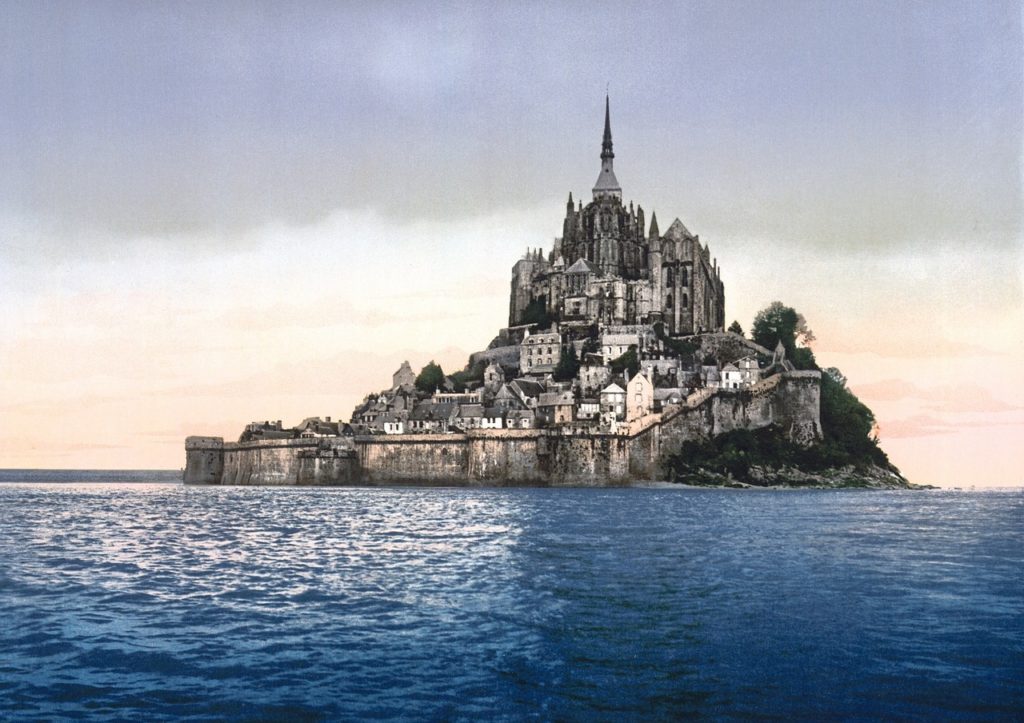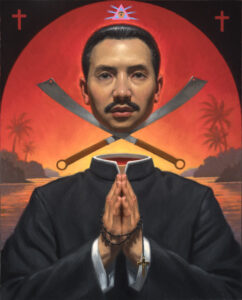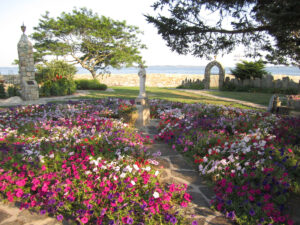Art lovers eagerly await the release of Radegund, Terrence Malick’s upcoming epic about Blessed Franz Jägerstätter, which is now in post-production.
For those who do not know Blessed Franz Jägerstätter’s story: He was an ordinary Austrian, the son of an unwed mother and a farmer, who later himself fathered a child out of wedlock. That, of course, is not what lead Pope Benedict XVI to declare him a martyr or to declare him “Blessed.” Franz eventually married a deeply Catholic wife and became a third-order Franciscan. A humble, principled man, he refused the Nazi’s demand to serve as the Mayor of Radegund after their invasion. Finally, he was executed by the Nazis at the age of 36, leaving behind a wife and three daughters under the age of 7.
It is worth noting that neither Jägerstätter’s bishop nor his local priest encouraged Franz to take this heroic step, Yet he chose to remain loyal to Christ rather than profess allegiance to Hitler. Among his early admirers was the Trappist monk, Thomas Merton, who helped bring his extraordinary courage to light.
In our own time, the release of Radegund will surely attract a whole new base of admirers. On an artistic level though, it is also likely to confirm Malick’s role as one of the major Catholic filmmakers of the 21st century. As I eagerly await its release, I have been reflecting more about Malick’s earlier work, especially the semi-autobiographical drama To the Wonder.
Like most Malick films, To the Wonder’s reviews were polarized. Rotten Tomatoes describes the film as “overly somber and emotionally unsatisfying,” giving it a paltry 46 percent on the “Tomatometer”. The general public scored it at an even more squalid 37 percent.
Yet as always, a cadre of critics raved about it. The Guardian dubbed it “bold and beautiful”; The Independent called it “entrancing”; The Daily Telegraph crooned: “a film of tender, often rapturous beauty.”
The funny thing is that the more I think about the film, the more convinced I am that this is really a false dichotomy. Knowing Malick, it may even be intentional, an attempt to flout cinematic convention in order to say what is most scandalous and unacceptable, yet undeniably true: Life is not neatly divided between beauty and ugliness, light and dark, beatitude and despair. Rather, it is a struggle and a longing, full of vicissitude and vacillation, with glimmers and glimpses which paradoxically attract and repel us, making us feel both at home and alien.
Certainly, Malick is the most philosophically grounded of artists. He was a Rhodes Scholar studying philosophy under Gilbert Ryle. A quarrel with his mentor on the concept of “world” in Kierkegaard, Heidegger, and Wittgenstein made Malick drop out of Oxford. He came back to the United States, taught philosophy at MIT, and became a journalist, before entering the American Film Institute’s MFA program in Hollywood.
More than anything he is a philosopher-filmmaker. As cast member Olga Kurylenko recalled, “He made me reread Anna Karenina, The Brothers Karamazov, and The Idiot.” Ben Affleck’s eyes widened as he sighed in one interview: “There was a lot of reading. The syllabus was big. I read Heidegger just because I know Terry did a translation of Heidegger.”
How does being a philosopher-filmmaker influence Malick’s filmmaking technique? For starters, consider the notes of Heidegger’s notion of authenticity and Dostoyevsky’s emphasis on taking responsibility in Malick’s decision to dispense with the script. When asked about his role would be in filming Song to Song, actor Christian Bale was quick to say he had no clue: “So anyone that gets involved with a Terry film, they know that, look, either I’m not in the film, or I might be the lead in the film. You know? Could be one or the other.” As Bale described it: “He would just be interested in exploring and seeing what happens. He would even give me a camera, a GoPro, and tell me to go out and shoot and see what I could find. It was more like life itself — let’s not plan it; let’s just investigate.”
Let the actors unveil what is there. Malick’s vision is metaphysical.
But Malick’s work is more than just metaphysical, it is theological.
The Genesis of Wonder
Kerouac biographer Paul Maher Jr.’s essay “Love That Loves Us: The Two Loves of To the Wonder” does a fantastic job of mapping out the essential movement of the film: the interplay of romantic and erotic union, the bewilderment at its dwindling, the dreariness and the longing it leaves behind.
Wonder begins at the moment two people fall in love, a genesis, if you will:
Newborn.
I open my eyes.
I melt.
Into the eternal night.
A spark.
I fall into the flame.
Here is Malick’s poetic genius: While what we hear belongs to Marina, what we see is distinctly Neil’s. We hear her thoughts the way she hears them in her head, but we see things the way he sees them. Together, there is a complementary unity of experience – two subjects and yet one subjective experience. As she says shortly thereafter:
Love makes us one.
Two…
one
I in you.
You in me.
What follows is a series of images of a state of love and a state of being that is not just, as Maher notes “idealized love as fresh and fleeting as the scenic countryside,” but a metaphysical healing, a recapitulation of Eden.
As Maher puts it, the spires of the cathedral of St. Michel mirror “the transcendental apex of their union,” whispering as they ascend the stair:
We climbed the steps…
…to the Wonder.
In the garden at the peak, Neil and Marina clasp hands – the two become one.
One might interpret the deeply entangled experience of the two subjects as a kind of cinematic retelling of the two different accounts of the creation of humanity presented in Genesis 1 and 2.
Or perhaps it is an allusion to Dante who pitched our Earthly Paradise at the very top of Mount Purgatory, from which point Adam and Eve fell.
Dante ends Purgatorio:
From that most holy wave I now returned
to Beatrice; remade, as new trees are
renewed when they bring forth new boughs, I was
pure and prepared to climb unto the stars.
But Neil and Marina are not yet ready for the stars.
The Fall of Wonder
Instead, we fall from the mountaintop of St. Michel to the flatlands of Oklahoma, to which Neil has brought Marina and her daughter Tatiana for no particularly good reason. It is a world that is literally and metaphorically flattened, broken, toxic. Accustomed to the bustling streets of France, Marina is soon confronted by a palpable emptiness: an empty home, empty streets, empty skies and fields, worst of all, an empty relationship.
One particularly memorable episode, we find her with Neil, sitting in a doctor’s clinic. They listen as the doctor lays out options for medical issues she is having. Removing her IUD means she doesn’t need a hysterectomy, but it does potentially mean children with Neil. “So would you like to have children?” the doctor asks Marina. “Someday,” she answers.
To the woman, he said, “I will greatly increase your pangs in childbearing; in pain you shall bring forth children, yet your desire shall be for your husband, and he shall rule over you.”
Neil, on the other hand, takes a job as an environmental inspector. Everywhere he goes the world is sick, poisoned; he searches but never manages to find a cause.
…cursed is the ground because of you.
Enter Father Quintana a troubled local Catholic priest (played by Javier Bardem) who throughout the film is wrestling with his own crisis of faith. Seeking divine love, the priest groans, “All I see is destruction. Failure. Ruin.”
I began to make a list of all the various ills both social and domestic which are put on display for us during this bleak escapade: drug abuse, infidelity, poverty, aging, violence, despair. After hitting triple digits, I finally gave up.
In such a broken world, love would appear a foolish even illusory enterprise. Yet as Fr. Quintana pronounces during one of his homilies: “You shall love, whether you like it or not.” What do we make of this demand, this non-negotiable fact? Is God imposing on us, making us an offer we can’t refuse? Is the necessity of loving a blessing or a curse? Surely, anyone who has experienced heartache – that is to say, everyone – has asked himself this question and felt the dissatisfaction no matter which answer is given.
As Marina says just after receiving Holy Communion, “My God, what a cruel war. I find two women inside me. One full of love for you. The other pulls me down toward the earth.”
St. Maximus the Confessor calls these two forces the gnomic and the natural will. The natural will “is a faculty desirous of what is in accordance with nature.” The gnomic will is “the self-chosen impulse and movement of reasoning toward one thing or another.” As the definitions make clear, the gnomic will is not a separate faculty, but an act dependent upon the natural will. In other words, the natural will is that fixed, primordial desire we all have for God, Goodness itself, and it is that desire for Goodness itself, which makes it possible to desire various goods, which is also precisely where we get ourselves into trouble.
Ralph McInerny once put it this way:
Somewhere in a passage I can no longer find Chesterton wrote that the young man knocking on the brothel door is looking for God. It sticks in the mind. It surprises with its rightness. Every human agent is seeking the good, however mistakenly, but we all want what is really good. God is our real good.
At times, however, it can appear as though God is hidden from us, or, even worse, that He hides Himself. As Fr. Quintana asks, “Why do you turn your back? How long will you hide yourself?”
Here one can hear echoes of Christ’s cry on the cross: “Eli Eli lama sabachthani?” (My God, my God, why have you forsaken me?”); of Luther’s hidden God; of St. Augustine’s anthropology: “You made us for Yourself, and our hearts are restless until they rest in You.”
The people in To the Wonder vividly illustrate the manifold miseries of a restless heart. But as the medievals would say, “God and nature do nothing in vain.” Though it may be temporarily thwarted, the natural will makes evident the real possibility of restitution, of ultimate satisfaction. A hole is only so big as the amount you take out.
The Hope of Wonder
Although Malick’s world is full of dreary sordid realities, it is also full of hope, but only of the distinctively theological kind.
Take Fr. Quintana’s version of St. Patrick’s prayer: “Teach us where to seek You. Christ be with me. Christ before me. Christ behind me. Christ in me. Christ above me. Christ on my right. Christ on my left. Christ in the heart.”
At the end of To the Wonder, Malick presents us with some rather enigmatic scenes. Marina and Neil have just separated for good. Back in France, we hear her thoughts, Marina’s pithy yet profound statement of gratitude: “Love that loves us…thank you.”
Then something strange happens. As Maher describes it, “Marina wanders the countryside…At some points, the land seems like Oklahoma, and it very well may be (in flashback) and remains an ending as ambiguous as any in a Malick film. She stares into the sun, the source of all. The Wonder.” Then, suddenly, we are brought back to Mont St. Michel in a jump cut. Why? What does it mean?
Maher may not understand, but for readers of Gregory of Nyssa’s classic The Life of Moses it all makes perfect sense.
Key to that work is Gregory’s notion of epektasis, perpetual growth, which he uses to describe Moses’s ascent up the mountain. This ascent is an allegory of the soul’s ascent within the spiritual life. What are we seeking? What are we climbing towards? Well, like Moses, we too are seeking God, who reveals himself in a mystical experience, a luminous darkness.
Similarly, when Marina looks back, her face is almost completely obscured by the intensity of the light, yet it is not a natural light: Her surroundings are cloaked in grey and clouds. Mont St. Michel is dark. Allegorically, Malick is making a strong theological point that despite all her failures, her mistakes and infidelities, Marina too, is being called back to Wonder, to God, to the “source of all.” But if her, why not others as well?
Such audacious hope, as brief a glimmer as it may be, redeems the film from its apparent gloominess. To hold up both the vanity of this world and at the same time the hope of its complete restitution is nothing short of a modern masterpiece.
Austin Choate is a Russian Byzantine Catholic and doctoral candidate in theology at the Institute for Orthodox Christian Studies, Cambridge.




